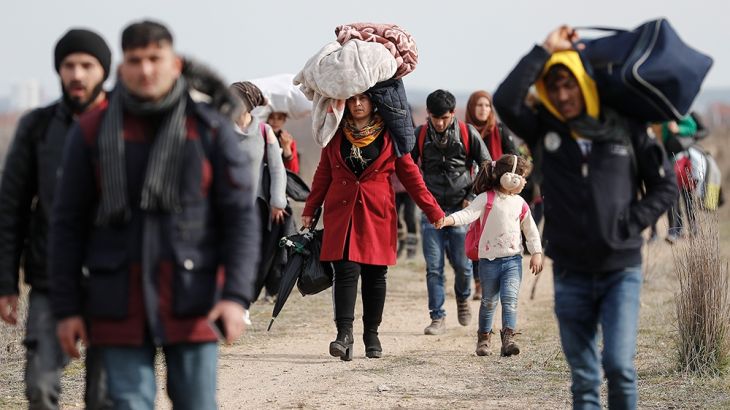EU-Turkey tensions rise as refugees gather at Greece border
Bloc stands by Greece and accuses Ankara of using migratory pressure for ‘political purposes’, a charge Erdogan denies.

European Union countries offered more money for border policing in Greece and humanitarian aid in Syria’s Idlib, but they were in a bind over Turkey as they sought to avert a mass influx of refugees and migrants.
EU interior ministers met in Brussels on Wednesday for emergency talks, to be followed by a meeting of foreign ministers on Thursday and Friday, as some 25,000 refugees and migrants gather on the Greek border, seeking to cross into Europe.
Keep reading
list of 3 itemsEU throws support behind Greece in refugee conflict with Turkey
Greece on high alert at Turkey border
That came after Turkey – citing the latest fighting in Syria – backed away from a 2016 deal with the bloc to keep refugees and migrants away from Europe.
In a joint statement, EU ministers recognised “the increased migratory burden and risks Turkey is facing” but also denounced “Turkey’s use of migratory pressure for political purposes.”
“This situation at EU’s external borders is not acceptable,” they said, in calling on Ankara to stick to the 2016 pact.
Speaking in Ankara, President Recep Tayyip Erdogan said Europe had to support Turkey’s “political and humanitarian solutions in Syria” if it wanted to resolve the situation.
Government spokesman Ibrahim Kalin denied this was blackmail.
“Our objective by opening the doors was not to create an artificial crisis, to place political pressure or to serve our interests,” he said, but Turkey’s capacity “has a limit”.
Greek riot police used water cannon and tear gas on Wednesday against refugees and migrants at the frontier, but Greece denied claims by Turkey that it killed at least one person trying to enter the country.
“Turkey is not an enemy, but people are not weapons either,” the EU’s top migration official, Margaritis Schinas, said in explaining that 700 million euros’ worth of extra EU funding for Greece would fortify the bloc’s external border there.
The EU is also preparing to offer 60 million euros in new humanitarian aid to Idlib, diplomats said. The city has been the latest flashpoint in the nine-year-old war in Syria, where Russia-backed Syrian forces fight rebels supported by Turkey.
Humanitarian efforts to support nearly one million people who fled the fighting have been overwhelmed, said the UN aid chief, Mark Lowcock.
EU member states are divided over Turkey.
Greece and Cyprus have pushed a tough line, but others are willing to offer further aid to support some 3.7 million Syrian refugees stranded in Turkey, on top of the six billion euros already granted in 2016.
The EU is desperate to avoid any repeat of 2015 and 2016, when more than a million refugees arrived on its soil, overwhelming security and welfare systems and increasing support for eurosceptic and nationalist groups across the bloc.
But EU’s ties with Turkey, a NATO ally, are strained over human rights and security issues, as well as Ankara’s hydrocarbons drilling in the east Mediterranean.
Human rights groups decried Athens’ hard-nosed acts on the border and its decision to suspend accepting asylum claims, but the EU expressed solidarity with Greece.
“The right to asylum does not mean that Erdogan can send how many migrants he wants into the European Union,” EU Home Affairs Commissioner Ylva Johansson told journalists on Wednesday.